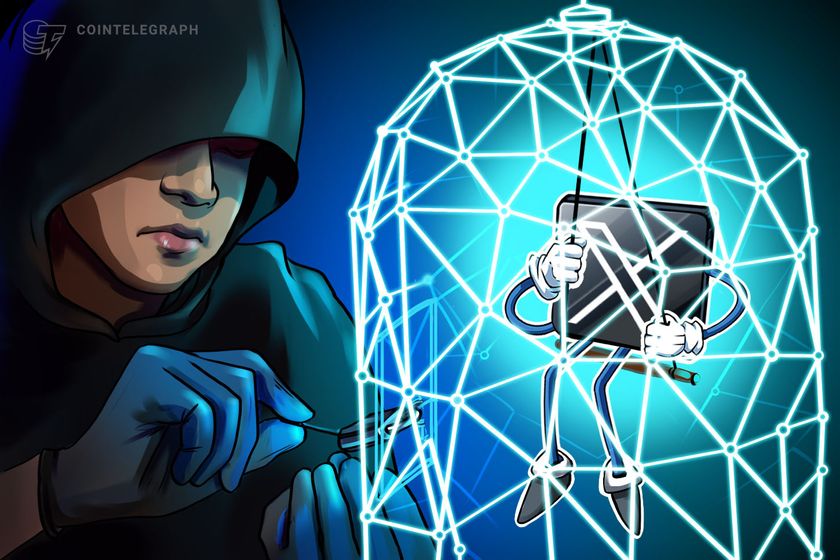
The co-founder of Animoca Brands, a leading firm in the blockchain gaming space, had their X social media account hacked and used to promote a fake Solana (SOL) token. In a new thread on the social media platform X, Animoca Brands – known for creating metaverse game The Sandbox (SAND) – says that founder and […]
The post Animoca Brands Founder’s X Social Media Account Hacked, Used To Promote Fake Solana Ecosystem Token appeared first on The Daily Hodl.

The X account of Animoca Brands co-founder Yat Siu was hacked to promote a bogus token in what appears to be the latest in a string of similar hacks in the past month.
Blockchain gaming conglomerate Animoca Brands confirmed its co-founder and chair, Yat Siu, was hacked on X to promote a fake token, in what appears to be the latest in a string of attacks on crypto X accounts.
“Unfortunately [Siu’s] social media account has been compromised,” Animoca posted to X on Dec. 26. “The token launch on Solana as claimed in a post was made by the hacker.”
In the now-deleted post, Siu’s account shared a link to a token launched on Solana memecoin launcher Pump.fun called Animoca Brands (MOCA) — named the same as the firm and its affiliated Mocaverse non-fungible token (NFT) collection.

Animoca Brands’ Yat Siu told Cointelegraph that NFTs can be considered an investment in one’s reputation, similar to a Picasso artwork.
Animoca Brands chairman Yat Siu believes that non-fungible tokens (NFTs) will make a comeback and perform better than they did during their peak in 2021.
Siu told Cointelegraph in an interview at the Bitcoin MENA event in Abu Dhabi that NFTs will be “even bigger” than during 2021 and 2022. Back then, NFT monthly volumes ranged from $1–5 billion, peaking at $6 billion in January 2022, according to data tracker CryptoSlam.
Since then, NFT sales volumes have declined, struggling to reach even $1 billion. Projects expected to succeed have also decided to close down. On Nov. 26, crypto exchange Kraken wound down its NFT business, while the Nike-owned NFT project RTFKT announced on Dec. 2 that it would shut down operations in January.

Hamster Kombat is preparing to launch the “largest airdrop in the history of crypto,” which could bring even more mainstream attention to the viral Web3 mobile game.
Telegram-based games like Hamster Kombat are setting the stage for true mainstream Web3 gaming adoption.
Viral clicker game Hamster Kombat is among the “first generation” of games to facilitate large-scale Web3 gaming adoption, according to Yat Siu, co-founder and chairman of Animoca Brands.
Siu told Cointelegraph in an interview:

Over half a million people are already on the waitlist for Humanity Protocol’s public testnet launch, expected to take place in the back half of 2024.
Decentralized identity solution Humanity Protocol is officially a unicorn after a recent $30 million raise lifted its valuation to $1 billion.
The $30 million Seed Round was led by Kingsway Capital, with participation from Animoca Brands, Blockchain.com, Hashed, Shima Capital and 20 other investors, Humanity Protocol wrote in a May 15 Medium post.w
Humanity Protocol plans to use the funds to expand its product development unit as the firm prepares for its public testnet launch in the second half of 2024.

Animoca Brands became the biggest validator of the TON blockchain in 2023, banking on the network effect of Telegram’s 800 million users to drive GameFi adoption.
Animoca Brands co-founder Yat Siu is confident that a number of investments and partnerships could prove fruitful in 2024 as mainstream institutional interest in Bitcoin (BTC) gathers steam.
Speaking exclusively to Cointelegraph at the Next Block Expo event in Berlin, the chairman of the gaming venture capital firm highlights some 70 investments made in 2023 that are expected to deliver results next year.
Related: Animoca eyes SportFi ecosystem, becomes Chiliz Chain validator
Chief among these is a high-profile partnership with The Open Network (TON) blockchain, which was announced on Nov.
“We actually think that’s a tool for mass onboarding with TON wallet. What’s not to be excited about?”
Siu also said that Animoca’s acquisition of the social casual gaming platform Gamee in July 2020 is set to capitalize on its growing presence as a gaming platform on Telegram.
“There were no advertising and in-app purchases, and nothing was allowed in Telegram until recently with the integration of TON.


"I was gobsmacked" — Nolan Bushnell said his conversation with Yat Siu on Web3 games changed his brain.
Nolan Bushnell, the founder of Atari and inventor of Pong — one of the first commercially successful video games — has shared optimism for the future of Web3 games, particularly as it comes to bringing ownership to virtual worlds.
During the Digital Entertainment Leadership Forum in Hong Kong on Aug. 25, Bushnell spoke alongside Animoca Brands co-founder Yat Siu, discussing the past, present and future of gaming. It was moderated by Sean Hung, the managing partner of Chiron Group.
Bushnell, who Yat Siu acknowledged as the “grandfather of gaming” — praised Web3 games for their ability to extend the concept of ownership into the digital landscape.
“Games will increasingly imitate all factors of life. Web3 with blockchain suddenly transmits ownership into the virtual world.”
The Atari founder currently serves as the Chief Knowledge Officer at Web3 gaming company Moxy — and kicked off the panel by sharing the topline details of a conversation he’d had with Siu in the days prior:
“I was just gobsmacked. I mean, we had you know, every once in a while you can have a conversation that changes your brain. We had one of those.”
I'm excited to be speaking at the DELF event. We've chosen Hong Kong for https://t.co/GNemkV0YDf's entrance to the Asian Market https://t.co/phUuANd9LB
— Nolan K Bushnell (@NolanBushnell) August 15, 2023
While Bushnell launched into his prediction of a world in the not too distant future, where the inside of self-driving cars could become a mobile gaming studio, Siu pointed to the potential of Web3 games to help economically monetize gameplay, as games become a more ubiquitous part of everyday life.
“The impact that Web3 gaming has already had…is that you can start earning money with the engagement of the time that you spend in these games.”
Siu said that despite games originally taking the form of “player versus environment” systems, where gamers play against the non-player characters (NPCs), the world of gaming — as seen through the rise of Minecraft and Roblox — has evolved to become a multiplayer ecosystem.
“You don't go to Fortnite to play against yourself or an environment. You go online to play against others, meaning that we, the players, are the content, but the difference is that we haven't really been compensated for it,” Siu explained.
When asked what he saw as the biggest promise provided by Web3 games, Bushnell said that the combination of “KYC and the immutability of blockchain” were the best ways to ensure that players in online games were not bots or bad actors.
Additionally, Bushnell predicted that games would soon become an essential part of the classroom, with students learning best by way of “story and simulation.”
Related: Play-to-earn has fatal flaws: How can Web3 gaming be more sustainable?
While the positives of Web3 games were readily espoused, Yat Siu noted some of the issues that had arisen alongside the proliferation of blockchain gaming.
“When you introduce Web3 and blockchain to any system, including games, you're introducing capitalism. And so the problems we have seen in the last 12 to 18 months comes from the fact that these games have become not just capitalist to the studio that produced it, but to every participant,” Siu said.
Despite the many flaws introduced by the financialization of games — many of which became readily apparent in the “toxicity” of play-to-earn games like Axie Infinity — Siu said that the inherently capitalist element would aid young gamers in gaining a financial education.
“If the world becomes more financially literate because of Web3 gaming — because they understand something about value — then I think the world will become safer.”
Magazine: Blockchain games aren’t really decentralized… but that’s about to change

Animoca Brands partners with hi, a Web3 neobanking app that features cryptocurrency exchange services, conventional digital banking and customized NFT-styled debit cards.
Animoca Brands co-founder and executive chairman Yat Siu sees significant potential in the personalization of Web3-based services as his firm earmarks $30 million for the neobank platform hi.
Siu’s investment firm plans to invest in the Web3 app that combines a cryptocurrency exchange, digital banking services and a customizable nonfungible token (NFT)-styled crypto debit card offering as part of its growing ecosystem.
Speaking exclusively to Cointelegraph, Siu said hi’s vision for its NFT debit card offering intersects with his views on the interplays of culture and Web3. Hi’s flagship crypto-friendly Mastercard debit card allows users to personalize their physical cards with an NFT avatar they own.
“It is an example of the ongoing shift toward personalization, where Web3 finally allows users the opportunity to express themselves and their individuality in new and exciting ways.”

A central feature of the agreement is the potential to amplify the utility of various Web3 tokens and NFTs. The hi ecosystem features Web3-integrated financial applications and its own hi protocol, which is an Ethereum Virtual Machine-compatible sidechain.
The two companies will also look to drive the adoption of a “unique-human authentication mechanism” through the hi protocol’s proof of human identity solution.
Related: Animoca still bullish on blockchain games, awaits license for metaverse fund
Hi co-founder Sean Rac told Cointelegraph that the protocol’s proof of human identity solution addresses shortcomings of the Web2 era, where a handful of companies gained control over user data and identity after establishing themselves as “dominant credential providers.”
According to Rac, hi’s solution addresses this by using a dual-node structure where one set of nodes serves as identity validators responsible for verifying accounts owned by humans. Meanwhile, block producers secure the network.
Rac added that the approach could open up possibilities for “human-only” networks and decentralized applications.
Animoca Brands and @hi_com_official
— Animoca Brands (@animocabrands) July 27, 2023
We entered into a MoU for partnership to support hi's dedicated work in bridging fiat & cryptocurrency worlds to onboard #Web3 to mass, creating real-world use cases for utility tokens like $SAND, $EDU, $APE & more! https://t.co/i5qOjMluPv
The partnership will allow users to send and receive Animoca Web3 ecosystem tokens, including The Sandbox (SAND) and ApeCoin (APE). The Web3 app is touted to have over 3.5 million users.
The card service is set to allow users to pay with a fiat or crypto debit card around the world, tapping into some 90 million merchants that use Mastercard services.
The platform looks to move into a space that neobanks like Revolut and N26 have shaped, while its focus on Web3 might attract proponents and enthusiasts to get on board, even if it’s just to have a debit card to flaunt their prized Bored Ape Yacht Club, Meebit or Pudgy Penguin NFTs.
Siu added that the investment was driven by the belief that hi would bring a new set of users to Web3 and Animoca’s own brands like The Sandbox.
“We believe that hi’s core application will facilitate on- and off-ramp rails and therefore further drive mass adoption.”
There could also be significant value in the deal for Animoca, which has invested in several different NFT and Web3 projects. Siu also noted investment would begin once both parties signed definitive agreements.
The neobank has secured the green light as a virtual asset service provider (VASP) in Lithuania, while it’s also recognized as a digital currency operator by Italy’s payments service regulator. Hi’s presence in Asia is in progress, with the platform undergoing pre-registration to secure a VASP license through the Hong Kong Securities and Futures Commission.
Earlier this month, Siu told Cointelegraph that Animoca was still awaiting a regulatory license in Hong Kong for its proposed $1 billion metaverse fund. The company continues to invest heavily in blockchain gaming and Web3 projects.
Magazine: Web3 Gamer: Earn Bitcoin in Minecraft, BGA’s 50/50 gender split, Oath of Peak hot take

Animoca Brands founder Yat Siu believes Hong Kong’s efforts to foster the Web3 ecosystem are in stark contrast to regulatory uncertainty hampering development in the United States.
Industry experts believe Hong Kong’s shifting attitude toward blockchain technology, cryptocurrencies and Web3 could entice businesses away from the United States.
The city has made a series of moves over the past year to foster the development of the Web3 space and enable retail investment into cryptocurrencies. The latest example of this is the formation of its Task Force on Promoting Web3 Development.
Yat Siu, a co-founder of Web3 investment firm Animoca Brands, is one of 15 industry experts invited to be an adviser to the task force, which will interface directly with key government officials and financial regulators.
Exciting news! Yat Siu (@ysiu), our co-founder and executive chairman, has been appointed to the Task Force on Promoting Web3 Development, established by the HKSAR government. Yat believes that the work of the Task Force will help to shape not only #HongKong but also globally… pic.twitter.com/8zEfwTez9I
— Animoca Brands (@animocabrands) July 3, 2023
In a wide-ranging, exclusive interview with Cointelegraph, Siu highlighted Hong Kong’s gradual change in attitude toward crypto and Web3 in recent years, putting the city in a unique position to attract startups and established firms to its jurisdiction.
While conceding that the U.S. should not be “counted out” of the Web3 race, Siu said that many firms in the sector are operating “under a regime of fear” due to a lack of regulatory clarity. This has been exacerbated in recent months by the U.S. Securities and Exchange Commission (SEC) filing separate charges against Binance.US and Coinbase for a raft of alleged unregistered securities offerings:
“The SEC doesn’t seem to be wanting to be consistent about this, in contrast to Hong Kong, or other jurisdictions like Japan, the Middle East or even Europe, which have rules that are starting to become consistent.”
Siu said that Hong Kong had seen an opportunity to take a leadership position in terms of driving Web3 development, while the U.S. seemingly “self-sabotaged” its potential to be a prime destination for companies in the sector.
Hong Kong also held the cryptocurrency space at arms length for a number of years, with restrictive policies outlawing retail investment into cryptocurrencies only recently overturned after lengthy consultation with industry proponents.
Siu said that the government had demonstrated a level of ‘agility’ in its changing stance towards the industry, considering that it had not always been welcoming to cryptocurrency companies.
Related: Expect better blockchain games in 2023, says Animoca Brands CEO
Hong Kong’s Web3 task force is also likely to be a fairly fluid arrangement. Siu told Cointelegraph that he’d been pleasantly surprised by the inclusion of so many Web3 proponents, a move that signals the city’s intent to continue fostering the sector.
The working group is yet to have a first meeting and Siu expects monthly or quarterly meetings with a variety of crypto, blockchain and Web3 working groups that have been established in Hong Kong.
Members of the Web3 task force have entered into a two-year agreement with the Hong Kong government and are set to advise on ways to drive growth of the industry. Siu envisions the task force driving development of the sector by fostering talent and encouraging exploration of blockchain solutions in tertiary education institutions:
“I think it's a great way in which we could build a closer relationship with the government and also sort of push forward the Web3 adoption agenda.”
As previously reported, Hong Kong’s efforts to kindle the Web3 sector have seen the city's Cyberport attract over 150 Web3 firms this year, while companies are reportedly spending between $2 to $25 million on attaining virtual asset service provider licenses to operate in the city.
 On Tuesday, global asset manager Hashkey, which focuses on crypto and blockchain investments, announced that it has closed its third fund at $500 million. The company’s “HashKey Fintech Investment III” is dedicated to developing crypto solutions, blockchain technology, and Web3 concepts. Hashkey Capital’s Fund III to Focus on Web3, Emerging Markets and Crypto Solutions Amid […]
On Tuesday, global asset manager Hashkey, which focuses on crypto and blockchain investments, announced that it has closed its third fund at $500 million. The company’s “HashKey Fintech Investment III” is dedicated to developing crypto solutions, blockchain technology, and Web3 concepts. Hashkey Capital’s Fund III to Focus on Web3, Emerging Markets and Crypto Solutions Amid […]